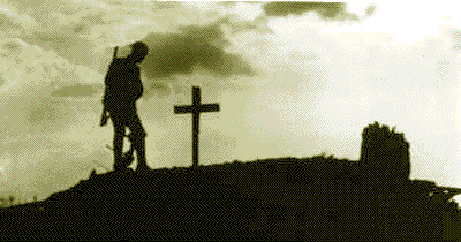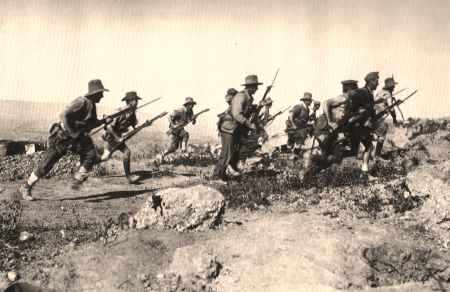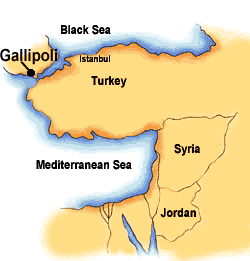April 26, 2005
Kim Beazley on Anzacs & strategic policy
Yesterday was Anzac Day in Australia:
 I read some of the commentary in the corporate media written about the Anzacs, Gallipoli 1915 and the Anzac Legend over the weekend.
I read some of the commentary in the corporate media written about the Anzacs, Gallipoli 1915 and the Anzac Legend over the weekend.
I was doing a bit of research--as much as I could do using dial-up internet-- for my posts on Public Opinion and Junk for Code.
Most of the commentary, including that on the weblogs, was about the new generation of cosmsopolitan Australians discovering their history, expressing their feelings of national pride and reinventing Anzac Day as a national day. The Anzac legend, with its values of heroism, courage and sacrifice, lives on is the theme of the commentary.
 It is acknowledged that the Diggers were reluctant heroes and that the military campaign was poorly planned by the British.
It is acknowledged that the Diggers were reluctant heroes and that the military campaign was poorly planned by the British.
The emphasis of yesterday's rhetoric was on mateship, sacrifice and national pride. Around 50,00 young Australian men died at Gallipoli. Slaughtered by all accounts.
No matter. Anzac Cove has now become a sacred site because the blood sacrifice changed the way we Australians saw the world and understood ourselves.
So why was Australia on the beaches of Gallipoli in 1915? Why celebrate a failed invasion of a distant country in which Australia had no strategic interest?

Horace Moore-Jones, The Coast North of Anzac Cove, 1915.
We should press this line of questioning, even though it makes us feel uncomfortable, because it leads to strategic policy considerations.
What was Australia doing there for heavens sake? It was on the other side of the world:
 By all accounts Australia had no strategic reason to be there in the Middle East.
By all accounts Australia had no strategic reason to be there in the Middle East.
Who were we defending Australia from?
The Turks?
But they were defending their homeland were they not?
It was Australia who was invading their homeland. It was Australia making war on Turkey, a country with which we had no quarrel and no history of conflict. Why the invasion?
Did not the Turks defend their homeland from invasion with courage, tenacity and honour?
Did they not hold out against the Australian invaders and eventually repel them?
What was a Labor Government (that of Andrew Fisher) doing sending Australian volunteer troops to fight in the terrible terrain on the edge of the Midlde East?

Horace Moore-Jones, The Terrible Country Towards Suvla, 1915
Doing our duty for the British Empire is the common and conventional answer to this line of questioning. Australia simply provided the canon fodder so that the British Empire could defend its imperial interests.
Not so says Kim Beazley, leader of the ALP. In a recent address to the Lowy Institute he defended Australia's involvement on good strategic grounds. This is a historical revisionism. How plausible is it?
Before he makes his case Beazley outlines 4 strategic premises that he says guides his thinking about Australia's national security.
"The first is that I do not take Australia's security for granted. Nothing in our nature as a country - our values, our people or our institutions - guarantees that the world will do us any favours. Our future security depends on the nature of the global and regional international systems, the scale of our national resources and the skill and effectiveness of our policies.Second, Australia's future security is in the hands of no one but we Australians ourselves. Our circumstances are unique, and so are our responsibilities. Some find it easy to fall back on the idea that we can sub- contract our security to others. We cannot. It is our responsibility alone.
Third, to fulfil that responsibility Australian governments must provide realistic assessments of our national situation; active, imaginative and effective policymaking; a tough sense of priorities; a long-term view; and a true appreciation of our assets and liabilities.
And fourth, the mark of good Australian policy is not how it deals with artificial choices between regional and global engagement, but how effectively it marshals all the policy options available to meet Australia's unique interests."
These premises of strategic policyre national security are acceptable to me.
So how does Beazley deploy them in relation to Gallipoli? He does by criticizing the conventional position. Beazley says that like all legends the ANZAC story takes on an air of inevitability:
"It is impossible to imagine a world in which Australians did not go ashore that morning at Gallipoli. But there was nothing inevitable about it. They were there because of policy decisions - strategic decisions - taken by Australian political leaders."
Fair enough.
"The Gallipoli legend of today minimises these decisions. It suggests that Australians found themselves on the Turkish shore that day because their political leaders were too unimaginative, too supine, too emotionally tied to Britain to see that this was someone else's war, in which Australia had no part."
Beazley says that this is a travesty of the truth. A truer account of the strategic dimensions of the Gallipoli story deserves to be better known. He then outlines his case:
"Australians as a people thought carefully about their security in the decades before 1914. As the strategic challenge from Germany grew from the 1880's, they recognised that Britain would be less and less able to continue guaranteeing Australia's security. And they realised that as Britain started looking for allies in Europe and Asia, its interests would sometimes diverge from Australia's. We started to see ourselves, not as a mere strategic appendage of empire, but as an active partner in imperial security. As such we had our own unique interests and perspectives, and our own responsibilities."
John Quiggin takes exception to this paragraph.
I will grant that a developing independence in strategic thinking about national security can be granted. So our strategic policy was increasingly built on own unique interests perspectives and responsibilities. But I have more questions?
Does Australia's national interest coincide with imperial interest of the British Empire in 1915? Did we really act as active partners in imperial security then?
However, Beazley is quite sure about this. So how does he argue his case? He says:
"We cannot understand the decisions of 1914, and we cannot understand Gallipoli, if we do not understand that Australia had compelling, direct and distinctively Australian strategic reasons to play its part in helping to ensure that British power was not eclipsed. We needed Britain to defend us from what we saw - rather presciently as it turned out - as direct threats closer to home."
We needed Britain to defend us direct threats closer to home. Australia's compelling, direct and distinctively strategic reasons were the direct threats to our homeland.
What were these threats? None come to my mind. Australia was not threatened by China or Japan. Or did Andrew Fisher peer into the glass darkly? All that Beazley says is that Australia has global interests in 1914. So what were these global interests that ensured Australia had to invade Turkey in 1915?
Beazley does not say. We have silence other than vague estures to the future-Japan in the 1930s? This historical revisionism amounts to going along with 'great and powerful friends' to ensure their support. It is the security insurance doctrine of foreign policy.